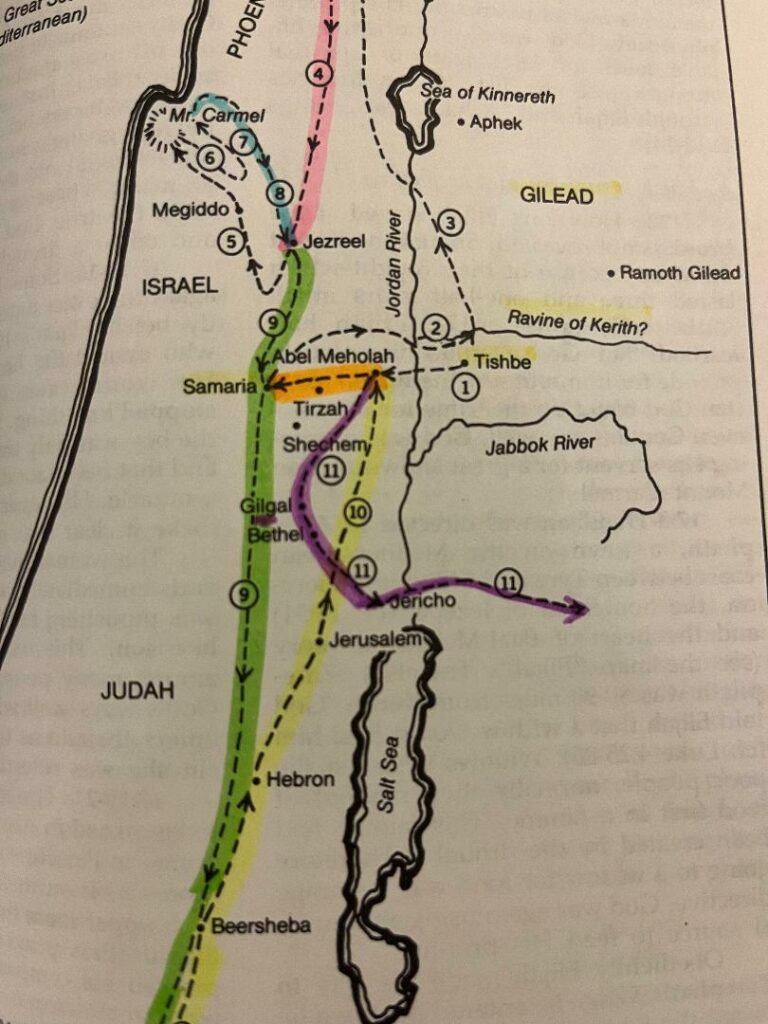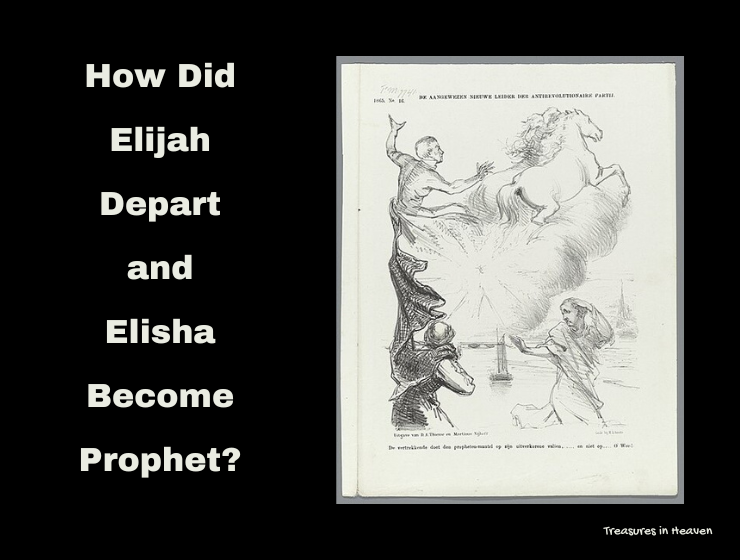The time had come for the Lord to take Elijah up to heaven in a whirlwind.
2 Kings 2:1a
In Part 11, Elijah had his last assignment from God. He confronted Ahaziah, Israel’s newest king. Ahaziah dared to send messengers to inquire of the false god of Ekron, Baal-zebub.
So, God again demonstrated His sovereign rule over His creation, a recurring theme in this series.
As we end our Elijah series, God directs this man of God to go to several places and will miraculously intervene one last time in Elijah’s life.
Let’s find out how Elijah departs this world and how Elisha succeeds him as God’s prophet to Israel.
Table of Contents
Elijah Tests Elisha Three Times
And Elijah said to Elisha, “Stay here; the Lord is sending me onto Bethel. 2 Kings 2:2a
We haven’t heard much about Elisha since he was anointed by Elijah. However, now we find them traveling together from Gilgal.
Gilgal was a hill country in Ephraim, about 8 miles NW of Bethel, and could be modern Jiljiliah, which is 7 miles NW of Bethel.
Apparently, Elisha and Elijah were aware that this would be Elijah’s last day on earth, and Elisha was determined to be with him until the end.

Perhaps Elisha didn’t want to miss out on a potential blessing. It was common for a dying person to pronounce blessings on others, and Elisha would not want to miss out on receiving God’s blessing on his life and ministry.
Or perhaps Elisha just wanted to be with him when the Lord took him home.
God directs Elijah three times to go to another place (Bethel, Jericho, and the Jordan River), and three times Elijah tests Elisha by saying, “Stay here.” Stay here where it’s comfortable.
Each time, Elisha refuses with a solemn vow to go with him to the end: “As surely as the Lord lives and you yourself live, I will never leave you.”
The Sons of the Prophets
In Bethel and Jericho, the sons of the prophets (apprentices) also knew that God would take Elijah away that day.
In both places, they asked Elisha, “Did you know that the Lord is going to take your master away from you today?”
Both times, Elijah replied, “Of course I know, but be quiet about it.” Don’t add to my sorrow by speaking about it.
As Elijah and Elisha left for the Jordan River, fifty of the apprentices followed at a distance.
At the Jordan River
Elijah took his mantle, rolled it up, and struck the water… 2 Kings 2:8a
Once the two men reached the Jordan, Elijah rolled up his cloak and, using it as a symbol of God’s power, struck the water with it. The river divided, and the two went across on dry land.
Two times in the past, God had parted the waters for the Israelites:
- He parted the Red Sea so the Israelites, under the leadership of Moses, could cross over on dry land while being pursued by the Egyptian armies. (Ex 14:21-22)
- He parted the Jordan River (Josh 3:14-17) when the Israelites needed to know that Joshua, Moses’ successor, was indeed God’s choice (Josh 3:7) and was among them; He would surely do everything He said He would do (Josh 3:10).
Did Elisha remember these two events that had happened some 500-plus years earlier?
Elisha’s Request
When they had crossed over, Elijah said to Elisha, “Tell me what I can do for you before I am taken from you.” 2 Kings 2:9a
After the two had crossed over on dry land, Elijah asked Elisha what He wanted from him before he was taken away.
Elisha requested the firstborn’s blessing, a double portion (Deut 21:17). The double portion was the amount the firstborn son would inherit to help care for his father’s estate.
However, here, Elisha asks for a double portion of God’s Spirit to be on him. He is not asking for material blessings, to perform twice as many miracles, or to become more well-known. Instead, Elisha wants God’s blessing to carry on Elijah’s ministry.
Elijah told him what he was asking for was a difficult thing because it was not Elijah’s to give. “Nevertheless,” Elijah said, “If you see me when I am taken from you, you will have it. If not, you won’t.”
Elijah’s Departure
As they continued walking and talking, a chariot of fire with horses suddenly appeared and separated the two of them. 2 Kings 2:11a
As Elijah and Elisha continued walking and talking together, something spectacular happened. A chariot of fire with horses suddenly appeared and drove right between them. The two were separated, and Elijah went up to heaven in a whirlwind.
Elijah is one of two men in the Bible who went into the presence of the Lord without experiencing death. The other man was Enoch (Gen 5:24).
Elisha saw it and cried out excitedly, “My father! My father! The chariots of Israel and its horsemen.”
Three things to note:
1) It’s unclear if Elijah was actually taken in the chariot of fire because Scripture says God took him in a whirlwind. The whirlwind was a sign of God’s presence, much like the pillar of cloud that led the Israelites in the wilderness (Ex 13:21).
2) Notice Elisha said, “The chariots of Israel.” He saw the chariot, but not the whirlwind. The chariot of fire and horses is also said to symbolize God’s presence. It demonstrated His power, strength, and majesty in fighting for Israel.
The power of the Lord is often associated with fire, wind, and storms, all elements that undermine the Canaanite god Baal. God was demonstrating that He was still waging war against the idolatry in Israel.
3) Elisha saw the event. His proclamation, “My father, my father, the chariots of Israel and its horsemen,” confirmed that he witnessed Elijah being taken up (even though it doesn’t say he saw Elijah go up in the whirlwind).
Elisha was both amazed at what he saw and grieved over losing his mentor and “father.” He tore his clothes as a sign of his grief.
Elisha then picked up Elijah’s mantle (cloak), which had been left behind, and returned it to the Jordan River.
Elisha’s First Act as Prophet
He took the mantle Elijah had dropped, and he struck the water. 2 Kings 2:14a
Using Elijah’s cloak like Elijah had previously, he struck the water, saying, “Where is the Lord, the God of Elijah?” Immediately, the river parted, and Elisha walked across on dry land.
Elisha essentially said, “God, demonstrate Your power as you did through Elijah.” When the waters parted, God verified to Elisha that he was doing just that.
Both Elisha and Joshua began their ministries by parting the Jordan River and probably in the same area near Jericho.
Interestingly, Elisha means “God saves,” and Joshua means “The Lord saves.”
When the fifty prophets who had followed from a distance saw Elisha, they recognized immediately that the spirit of Elijah now rested on Elisha. When they met, they bowed low to the ground before him.
However, they also asked to go search for Elijah. It’s not that they doubted that the Lord had taken him up, as Elisha would have told them, but they insisted that maybe God had transported him to a mountain or valley.
Elisha tried to talk them out of it, but they persisted. So, Elisha finally gave them permission, and even though he knew it was futile, he no longer refused them.
They returned three days later without finding Elijah. Finally, the prophets accepted that Elijah was gone, just as Elisha had said.
God’s Miracles Through Elijah
| God’s Miracles Through Elijah | Elements involved |
| Elijah fed by ravens | Water, birds, and food |
| Widow’s flour and oil multiplied | Flour and oil |
| Widow’s dead son raised to life | Life |
| Elijah’s sacrifice and altar consumed | Water and fire |
| Ahaziah’s commanders and soldiers consumed | Fire |
| Jordan River parted | Water |
| Elijah’s transport to heaven | Fire and wind |
What We Can Learn
Throughout this series, an overarching theme is God’s sovereignty. In Part 12, we see God intervening in history once again to demonstrate His power and control over His creation.
Additionally, we see Elisha’s loyalty and persistence when he insists on staying with Elijah to the end and his faith when he strikes the Jordan River with Elijah’s cloak.
Elisha asked, “Where is the Lord, the God of Elijah?” He fully understood that God, not the cloak or himself, had the power to part the river.
God is looking for people today who will have faith in Him, not other people or things such as money or power. He is the living God and Father of our Lord Jesus Christ.
How easy or hard is it for you to have complete and total faith in God?
What hope does this story give you when you are going through a season of transition?
Final thoughts
We have come to the end of our story about Elijah. He departed this earth in a spectacular way and successfully handed over the reins to Elisha.
Elisha showed total loyalty to Elijah and refused to stay behind when Elijah told him to “Stay here.” As a result of not leaving his mentor and “father,” he saw Elijah’s departure and the chariot of fire with horses.
Furthermore, he received the double portion he requested because he saw these things. Elisha now had Elijah’s spirit resting on him, and he proved it when he also parted the Jordan River.
Elisha’s faith is an example of how we should look to God in faith for everything, including when we experience an uncertain transition.

The story of Elijah’s dramatic departure and Elisha’s succession is a powerful testament to God’s enduring presence and His call to faithfulness. It challenges us to consider our own responses to God’s call, our willingness to persevere in faith, and our readiness to embrace the roles He assigns us. As Elisha looked to God in faith and received His blessing, so we are called to trust in God’s sovereignty and seek His guidance in all aspects of our lives. This narrative is a beacon of hope and assurance, reminding us that God’s work continues through His people, empowered by His Spirit, across all seasons of life.
The questions posed at the end of the article — about the ease or difficulty of complete faith in God and the hope provided by this story during transitions — are deeply resonant. They invite personal reflection on our faith journey and encourage us to trust in God’s steadfastness, even amidst life’s uncertainties.
Although God doesn’t normally work in such dramatic ways today, the principles remain the same. Our God is faithful and worthy of our faith. He is sovereign and in control. I loved Elisha’s response when he saw the chariot and horses. Excitement mixed with sorrow which seems to define what life is like for many of us today. God is good, but we still face difficulties and uncertainties in this life. Faith doesn’t always come naturally, but as we grow in Christ, we find it easier.
Thank you for sharing your perspective, S.J. Have a blessed day!